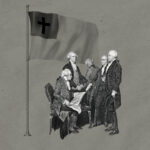The U.S. Commission on International Religious Freedom (USCIRF) recently released the 2017 edition of its annual report on religious liberty around the world. In their report, the USCIRF documents religious freedom abuses and violations in 36 countries and makes country-specific policy recommendations for U.S. policy.
One country worthy of particular attention is Russia. For the first time Russia has been designated as a “country of particular concern” under the International Religious Freedom Act for “particularly severe violations of religious freedom.”
Ironically, Russia was set to host a first-ever summit on religious freedom sponsored by the Billy Graham Evangelistic Association. As Franklin Graham announced on Facebook last August:
Earlier this year I announced that the Billy Graham Evangelistic Association would hold the World Summit in Defense of Persecuted Christians–the first event of its kind in Moscow.
We were looking forward to this significant event being held in Russia because no one knows modern Christian persecution better than the church that suffered under communist rule. However, just a few weeks ago Russia passed a law that severely limits Christians' freedoms.
It seems that every week we learn of another example from a part of the globe that shows how critically we need to have this World Summit in Defense of Persecuted Christians, which will now take place May 10-13, 2017 in Washington, D.C.
Religious Liberty as a Foreign Policy Priority
The summit held last week in Washington, D.C., brought together “more than 600 victims, advocates and leaders from 130 countries to help raise global awareness and do something about this crisis.” Among the speakers was Vice President Mike Pence. After acknowledging that Christians are the most persecuted faith group on the planet, Pence boldly promised that the Trump administration would support religious liberty across the globe:
Under President Donald Trump, America will continue to condemn persecution of any kind, of any faith, any place, any time. We will stand against it with our ideals and with all our might.
President Trump will continue to stand without apology to protect this fundamental freedom, not just for our people but stand for it in the world. Since the founding of our nation, America has stood for the proposition that the right to believe and the right to act on one’s beliefs is the right of all peoples at all times. Protecting and promoting religious freedom is a foreign policy priority of the Trump administration.
I believe Vice President Pence is sincere in his committement to religious freedom. But it’s imperative we hold him to his word by ensuring the administration turns these promises into policy.
Every Christian in America should pressure the Trump administration to ensure protecting and promoting religious freedom truly becomes a foreign-policy priority. A primary way the Trump administration can do that is to protect and promote the USCIRF. USCIRF is an independent, bipartisan U.S. federal government commission, the first of its kind in the world, dedicated to defending the universal right to freedom of religion or belief abroad. As former USCIRF commissioner Nina Shea has said, “USCIRF is one reliable voice within the government that does not find the issue of religious freedom too sensitive to bring up with foreign potentates.”
Persecutors of Christians Hate the USCIRF
USCIRF was created in 1998 to “monitor religious freedom in other countries and advise the president, the secretary of state, and Congress on how best to promote it.” At the time of the commission’s founding Congress believed that the foreign policy establishment was not giving due attention to issues of religious liberty. From the day it was established the commission has frustrated and annoyed foreign persecutors and their American apologists.
Eliot Abrams, a former chairman of the commission, said in a 2001 interview, “The State Department, the media, and the lobbies were very interested in things like freedom of the press, independent judiciaries, fair trials, and free elections, but much less interested than they should be in freedom of religion. Many members of Congress felt that this was because too many people in the foreign policy establishment were pretty secular themselves.”
In a world filled with religious believers, a foreign policy establishment comprising committed secularists makes as much sense as hiring linguists at the State Department who refuse to speak any language but English. Russell Kirk wisely acknowledged, “At heart, political problems are moral and religious problems.” Failing to recognize this fact leads us to misdiagnose and mistreat the political problems we face.
Rather than trying to secretly dismantle the USCIRF (as happened a few years ago) or ignore their recommendations (as happens almost every year), Congress and the president should give the commission a more active role in policymaking.
Moral Center of American Diplomacy
The joint freedoms of religion and conscience constitute the “first freedom” and deserve protection both in our own country and also abroad. Indeed, the moral center and chief objective of American diplomacy should be the promotion of religious freedom. Nathan Hitchen explains why:
The logic is that religious freedom is a compound liberty, that is, there are other liberties bound within it. Allowing the freedom of religion entails allowing the freedom of speech, the freedom of assembly, and the liberty of conscience. If a regime accepts religious freedom, a multiplier effect naturally develops and pressures the regime toward further reforms. As such, religious liberty limits government (it is a “liberty” after all) by protecting society from the state. Social pluralism can develop because religious minorities are protected. And the prospect of pluralism in the Middle East is especially enticing as it potentially combats the spread of Islamic radicalization.
In the post-9/11, pre-Iraq War era, I subscribed to the project of democracy promotion precisely because I believed it would lead to an expansion of religious liberty in the Middle East—and hence lead to the outcomes that Hitchen argues would flow from religious openness and pluralism. Like many other American Christians, I now recognize that democracy alone is insufficient for securing security or diplomatic progress, as we learned in 2006 when the Palestinian National Authority gave power to the terrorist group Hamas in democratic elections.
Of course, religious liberty promotion is no more a political science panacea than was democracy promotion. But as Hitchen notes, “Religious liberty would help society grow so complex that no totalizing ideology, no philosophical monism, could feasibly dominate the public square, because no single ideology would accurately reflect social reality.”
That’s a modest goal, no doubt, but one worthy of being embraced by Christians. A world where everyone can worship freely is a safer world for everyone.
Free eBook by Tim Keller: ‘The Freedom of Self-Forgetfulness’
 Imagine a life where you don’t feel inadequate, easily offended, desperate to prove yourself, or endlessly preoccupied with how you look to others. Imagine relishing, not resenting, the success of others. Living this way isn’t far-fetched. It’s actually guaranteed to believers, as they learn to receive God’s approval, rather than striving to earn it.
Imagine a life where you don’t feel inadequate, easily offended, desperate to prove yourself, or endlessly preoccupied with how you look to others. Imagine relishing, not resenting, the success of others. Living this way isn’t far-fetched. It’s actually guaranteed to believers, as they learn to receive God’s approval, rather than striving to earn it.
In Tim Keller’s short ebook, The Freedom of Self-Forgetfulness: The Path To True Christian Joy, he explains how to overcome the toxic tendencies of our age一not by diluting biblical truth or denying our differences一but by rooting our identity in Christ.
TGC is offering this Keller resource for free, so you can discover the “blessed rest” that only self-forgetfulness brings.


































